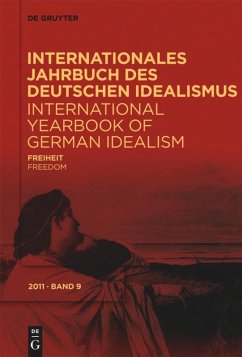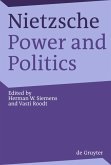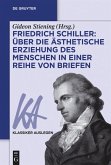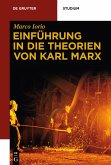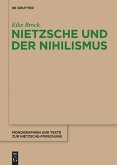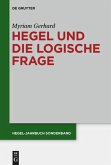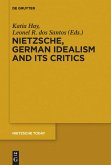Freedom is one of the central themes of classical German philosophy. For Kant freedom is the "keystone of the edifice of a system of pure reason." Fichte called his Science of Knowledge the "first system of freedom." To the early Schelling freedom is "the alpha and omega of all philosophy," while the later Schelling joins the philosophy of freedom with the question of the origin of evil. Hegel conceives freedom as "the essence of spirit," whose concrete forms in art, religion, and world history it is the task of philosophy to describe.
The articles collected in the 9th volume of the Internationales Jahrbuch des Deutschen Idealismus/International Yearbook of German Idealism offer views from different perspectives on the diverse significance and systematic function distinctive of the concept of freedom in classical German philosophy.
Beiträger/Contributors: Hans Friedrich Fulda, Pierre Keller, Heiner F. Klemme, Christian Klotz, Franz Knappik, Michelle Kosch, Charles Larmore, Wayne Martin, Alex Neill / Sandy Shapshay, Rocco Porcheddu, Sebastian Schwenzfeuer, Allen Wood.
Herausgeber/Editors: Fred Rush (University of Notre Dame); Jürgen Stolzenberg (Martin-Luther-Universität Halle/Wittenberg)
Freiheit ist eines der zentralen Themen der klassischen deutschen Philosophie. Für Kant ist Freiheit der "Schlußstein von dem ganzen Gebäude eines Systems der reinen Vernunft". Fichte nannte seine Wissenschaftslehre das erste System der Freiheit. Dem frühen Schelling ist Freiheit "das A und O aller Philosophie", während der spätere Schelling die Philosophie der Freiheit mit der Frage nach der Herkunft des Bösen verbindet. Hegel begreift Freiheit als das "Wesen des Geistes", dessen Konkretionen in Kunst, Religion und Weltgeschichte die Philosophie darzustellen habe.
Die im 9. Band des Internationalen Jahrbuchs des Deutschen Idealismus / International Yearbook of German Idealism versammelten Beiträge nehmen aus unterschiedlichen Perspektiven zu der Vielfalt der Bedeutung und der systematischen Funktion Stellung, die den Begriff der Freiheit in der klassischen deutschen Philosophie auszeichnen.
Freedom is one of the central themes of classical German philosophy. ForKant freedom is the "keystone of the edifice of a system of pure reason." Fichte called his Science of Knowledge the "first system of freedom." To the early Schelling freedom is "the alpha and omega of all philosophy," while the later Schelling joins the philosophy of freedom with the question of the origin of evil. Hegel conceives freedom as "the essence of spirit," whose concrete forms in art, religion, and world history it is the task of philosophy to describe.
The articles collected in the 9th volume of the Internationales Jahrbuch des Deutschen Idealismus/International Yearbook of German Idealism offer views from different perspectives on the diverse significance and systematic function distinctive of the concept of freedom in classical German philosophy.
Beiträger/Contributors: Hans Friedrich Fulda, Pierre Keller, Heiner F. Klemme, Christian Klotz, Franz Knappik, Michelle Kosch, Charles Larmore, Wayne Martin, Alex Neill / Sandy Shapshay, Rocco Porcheddu, Sebastian Schwenzfeuer, Allen Wood.
Herausgeber/Editors: Fred Rush (University of Notre Dame); Jürgen Stolzenberg (Martin-Luther-Universität Halle/Wittenberg)
The articles collected in the 9th volume of the Internationales Jahrbuch des Deutschen Idealismus/International Yearbook of German Idealism offer views from different perspectives on the diverse significance and systematic function distinctive of the concept of freedom in classical German philosophy.
Beiträger/Contributors: Hans Friedrich Fulda, Pierre Keller, Heiner F. Klemme, Christian Klotz, Franz Knappik, Michelle Kosch, Charles Larmore, Wayne Martin, Alex Neill / Sandy Shapshay, Rocco Porcheddu, Sebastian Schwenzfeuer, Allen Wood.
Herausgeber/Editors: Fred Rush (University of Notre Dame); Jürgen Stolzenberg (Martin-Luther-Universität Halle/Wittenberg)
Freiheit ist eines der zentralen Themen der klassischen deutschen Philosophie. Für Kant ist Freiheit der "Schlußstein von dem ganzen Gebäude eines Systems der reinen Vernunft". Fichte nannte seine Wissenschaftslehre das erste System der Freiheit. Dem frühen Schelling ist Freiheit "das A und O aller Philosophie", während der spätere Schelling die Philosophie der Freiheit mit der Frage nach der Herkunft des Bösen verbindet. Hegel begreift Freiheit als das "Wesen des Geistes", dessen Konkretionen in Kunst, Religion und Weltgeschichte die Philosophie darzustellen habe.
Die im 9. Band des Internationalen Jahrbuchs des Deutschen Idealismus / International Yearbook of German Idealism versammelten Beiträge nehmen aus unterschiedlichen Perspektiven zu der Vielfalt der Bedeutung und der systematischen Funktion Stellung, die den Begriff der Freiheit in der klassischen deutschen Philosophie auszeichnen.
Freedom is one of the central themes of classical German philosophy. ForKant freedom is the "keystone of the edifice of a system of pure reason." Fichte called his Science of Knowledge the "first system of freedom." To the early Schelling freedom is "the alpha and omega of all philosophy," while the later Schelling joins the philosophy of freedom with the question of the origin of evil. Hegel conceives freedom as "the essence of spirit," whose concrete forms in art, religion, and world history it is the task of philosophy to describe.
The articles collected in the 9th volume of the Internationales Jahrbuch des Deutschen Idealismus/International Yearbook of German Idealism offer views from different perspectives on the diverse significance and systematic function distinctive of the concept of freedom in classical German philosophy.
Beiträger/Contributors: Hans Friedrich Fulda, Pierre Keller, Heiner F. Klemme, Christian Klotz, Franz Knappik, Michelle Kosch, Charles Larmore, Wayne Martin, Alex Neill / Sandy Shapshay, Rocco Porcheddu, Sebastian Schwenzfeuer, Allen Wood.
Herausgeber/Editors: Fred Rush (University of Notre Dame); Jürgen Stolzenberg (Martin-Luther-Universität Halle/Wittenberg)

